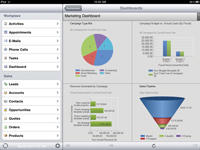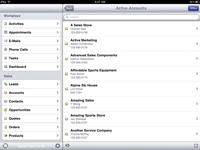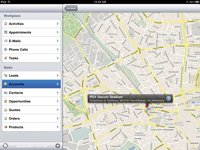News
Microsoft Readies Dynamics CRM Mobile
Richer mobile apps and Apple tablet support give Microsoft a better parity case against Salesforce.com on an important user requirement.
- By Jeffrey Schwartz
- February 26, 2012
Looking to fill a key hole in its customer relationship management (CRM) software, Microsoft has committed to bringing its Dynamics CRM suite to the iPad and other popular mobile device platforms next quarter.
The move should be a welcome addition to customers and to partners who implement Dynamics CRM -- especially because rival Salesforce.com Inc. has talked up its iPad and mobile device support for some time. And it comes as there is no slowdown in enterprise adoption of iPads (see "Apple in the Enterprise: Microsoft Partners Help Apple Get Down to Business").
Microsoft's Q2 Service Update of Dynamics CRM will also offer native mobile client support for the iPhone (iOS 5+), Android (2.2+) and BlackBerry mobile devices (6.x and 7.x) and, of course, its own Windows Phone platform (7.5). The iPad and iPad 2 requirement is iOS 5+.
While an offline mode will be supported for most devices when they can't access the Dynamics CRM on-premises server or online service, Microsoft, oddly, will not support offline data in the initial release for Windows Phone.
Jeffrey Goldstein, managing director of New York-based Queue Associates Inc., a Microsoft Dynamics partner, welcomed the tablet announcement. "This is great news; we get requests for iPad support," Goldstein said.
Microsoft revealed its plans at the eXtremeCRM 2012 Berlin conference in February and in a blog post by the new General Manager of Dynamics CRM, Dennis Michalis, who in January replaced longtime GM Brad Wilson.
"The most successful customers are innovating with mobility, using every kind of device they can deploy CRM functionality on, and they are going deeper with Microsoft Dynamics CRM flexibility for their specific needs than ever before," Michalis wrote. "We are providing more flexibility in mobility than any other CRM provider. Period. CRM where you want to consume it on the device you use."

[Click on image for larger view.] |

[Click on image for larger view.] |

[Click on image for larger view.] |
| Three views of Microsoft Dynamics CRM Mobile on an iPad. |
The company said the new offering, called Microsoft Dynamics CRM Mobile, is cloud-based and is designed to provide mobile client service specific to the supported platforms, allowing sales reps to synchronize information such as sales pipelines, providing offline access to the data. Based on Microsoft XRM (the application development platform), partners and customers will be able to extend their existing CRM apps to CRM Mobile.
Microsoft is also making Dynamics CRM more social with the new update, which will offer activity feeds, status updates and the ability to "like" content. Salesforce.com has made social networking a key theme of its cloud-based CRM portfolio.
Partners and customers will be able to manage CRM Mobile centrally, Microsoft said. Administrators will be able to configure record types, forms, views and offline synch rules as well as the navigation structure for the mobile app, according to the Release Preview Guide. The goal is to consolidate management of the CRM app for mobile users. To support the requirements of differing groups within an organization, admins will be able to configure multiple role-specific profiles customized for specific users. CRM Mobile will also support remote wipe in the event a mobile device is stolen or lost.
CRM Mobile will cost $30 per user per month and will be released in 40 global markets supporting 41 languages (though initially in 24 markets supporting 10 languages). The per-user licensing permits up to three devices per user, which would support common scenarios such as a salesperson having a smartphone and a tablet and occasionally needing to access data on another smartphone.
In addition to the new mobile clients and social features, the Service Update will also bring "cross-browser support for broad access, data visualization capabilities for unique insight [and] big additions to our Marketplace," Michalis wrote.
Describing browser flexibility as a major theme of the release, Microsoft noted that Web browser options will include Chrome, Firefox and Safari.
See Also:
About the Author
Jeffrey Schwartz is editor of Redmond magazine and also covers cloud computing for Virtualization Review's Cloud Report. In addition, he writes the Channeling the Cloud column for Redmond Channel Partner. Follow him on Twitter @JeffreySchwartz.